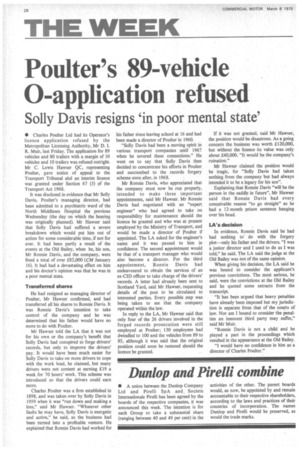Poulter's 89-vehicle 0-application refused
Page 30

If you've noticed an error in this article please click here to report it so we can fix it.
Solly Davis resigns 'in poor mental state'
• Charles Poulter Ltd had its Operator's licence application refused by the Metropolitan Licensing Authority, Mr D. I. R. Muir, last Friday. The application for 89 vehicles and 80 trailers with a margin of 10 vehicles and 10 trailers was refused outright. Mr C. Lewis Hawser QC, representing Poulter, gave notice of appeal to the Transport Tribunal gid an interim licence was granted under Section 67(5) of the Transport Act 1968.
It was disclosed in evidence that Mr Solly Davis, Poulter's managing director, had been admitted to a psychiatric ward of the North Middlesex Hospital the previous Wednesday (the day on which the hearing was originally planned). Mr Hawser Said that Solly Davis had suffered a severe breakdown which would put him out of action for some considerable time, if not for ever. It had been partly a result of the events at the Old.Bailey, when he, his son, Mr Ronnie Davis, and the company, were fined a total of over £82,000 (CM January 16). It had had a devastating effect on him and his doctor's opinion was that he was in a poor mental state.
Transferred shares He had resigned as managing director of Poulter, Mr Hawser confirmed, and had transferred all his shares to Ronnie Davis. It was Ronnie Davis's intention to take control of the company and he was determined that his father would have no more to do with Poulter.
Mr Hawser told the LA that it was not for his own or the company's benefit that Solly Davis had conspired to forge drivers' records, but only to improve the drivers' pay. It would have been much easier for Sony Davis to take on more drivers to cope with the work load, he claimed, but many drivers were not content at earning £19 a week for 70 hours' work. This scheme was introduced so that the drivers could earn more.
Charles Poulter was a firm established in 1898, and was taken over by Solly Davis in 1959 when it was "run down and making a loss," said Mr Hawser. "Whatever other faults he may have, Solly Davis is energetic and active," he said, as the business had been turned into a profitable venture. He explained that Ronnie Davis had worked for his father since leaving school at 16 and had been made a director of Poulter in 1960.
"Solly Davis had been a moving spirit in various transport companies until 1967 when he severed these connections." He went on to say that Solly Davis then decided to concentrate his efforts in Poulter and succumbed to the records forgery scheme soon after, in 1968.
Mr Ronnie Davis, who appreciated that the company must now be run properly, intended to make three important appointments, said Mr Hawser. Mr Ronnie Davis had negotiated with an "expert engineer" who had agreed to take on responsibility for maintenance should the licence be granted and who was at present employed by the Ministry of Transport, and would be made a director of Poulter if appointed. The LA asked for the engineer's name and it was passed to him in confidence. The second appointment would be that of a transport manager who would also become a director. For the third appointment, Ronnie Davis had endeavoured to obtain the services of an ex-CID officer to take charge of the drivers' records. A letter had already been sent to Scotland Yard, said Mr Hawser, requesting details of the post to be circulated to interested parties. Every possible step was being taken to see that the company operated within the law.
In reply to the LA, Mr Hawser said that only four of the 26 drivers involved in the forged records prosecution were still employed at Poulter; 130 employees had dwindled to 100 and the vehicles from 89 to 85, although it was said that the original position could soon be restored should the licence he granted„ If it was not granted, said Mr Hawser, the position would be disastrous. As a going concern the business was worth £120,000, but without the licence its value was. only about 00,000. "It would be the company's ruination."
Mr Hawser claimed the position would be tragic, for "Solly Davis had taken nothing from the company but had always intended it to be a legacy for his son".
Explaining that Ronnie Davis "will be the person in the saddle in future", Mr Hawser said that Ronnie Davis had every conceivable reason "to go straight" as he had a 12-month prison sentence hanging over his head.
LA's decision In evidence, Ronnie Davis said he had had nothing t6 do with the forgery plot—only his father and the drivers. "I was a junior director and I used to do as I was told," he said. The LA said the judge at the Old Bailey was not of the same opinion.
When giving his decision, the LA said he was bound to consider the applicant's previous convictions. The most serious, he said, were the convictions at the Old Bailey and he quoted some extracts from the transcript.
"It has been argued that heavy penalties have already been imposed but my jurisdiction is separate from that of the courts of law. Nor am I bound to consider the penalties an innocent third party may suffer," said Mr Muir.
"Ronnie Davis is not a child and he played a part in the proceedings which resulted in the appearance at the Old Bailey.
"I would have no confidence in him as a director of Charles Poulter."




























































































































































